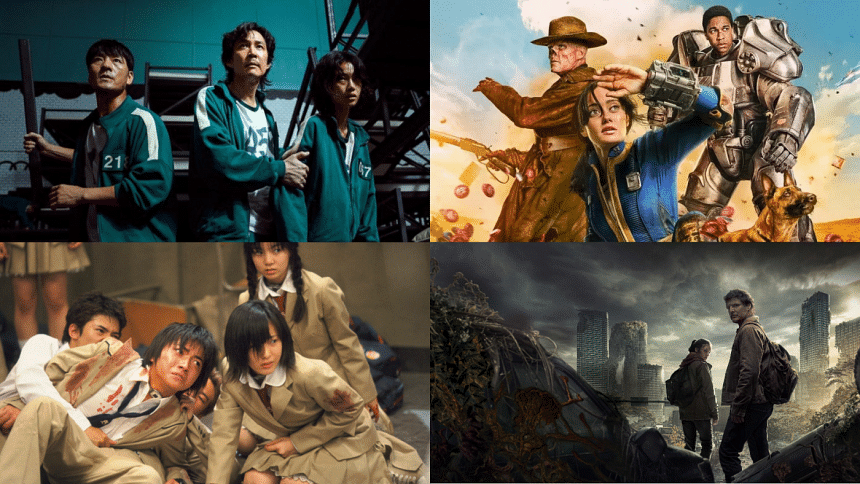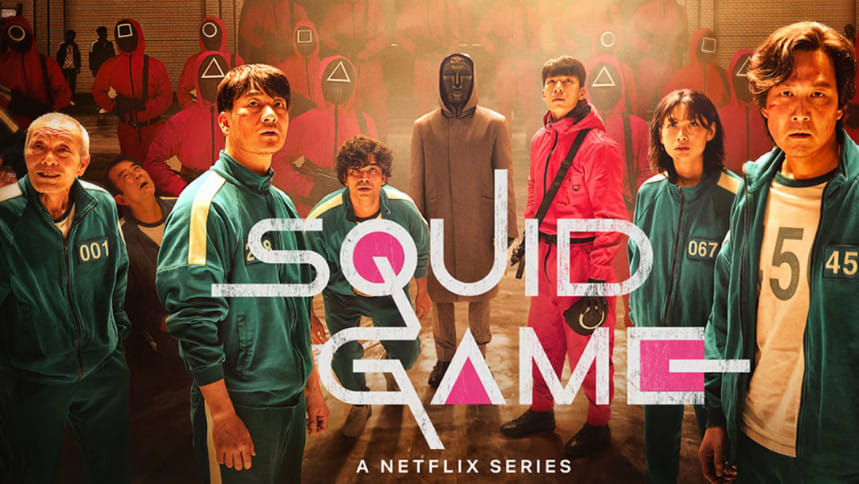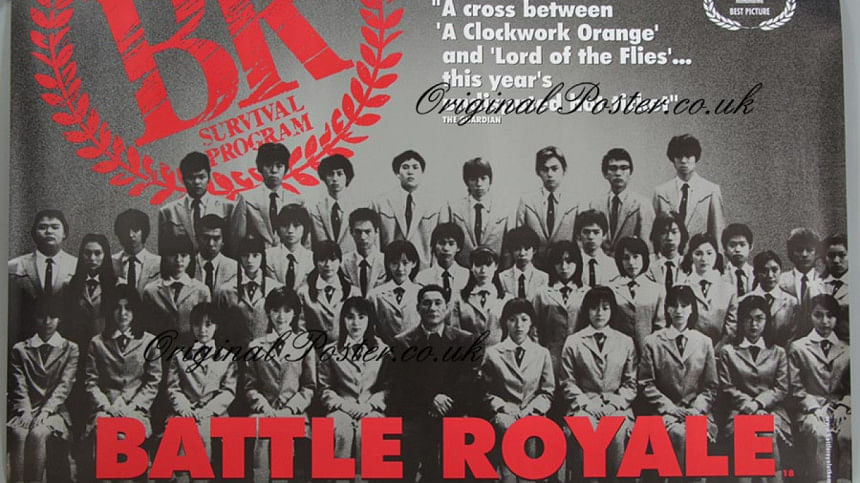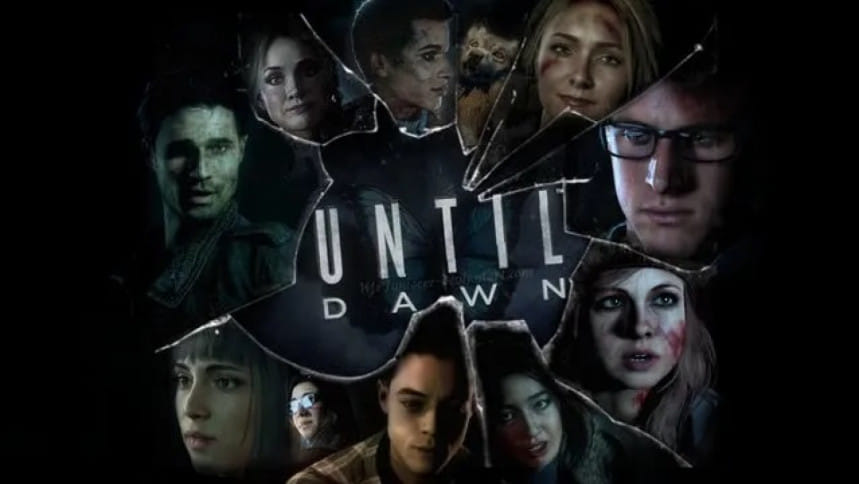Why do we crave survival game tropes?

The eerie whistle of a haunting melody, the countdown of a clock ticking towards doom, and a desperate player caught between having to take a drastic step either for or against morality — survival game shows have become a global obsession. From the blood-soaked battlegrounds of "Battle Royale" to the dystopian depths of "Squid Game", these narratives have gripped audiences, offering a voyeuristic thrill into life-or-death scenarios. But why are we so drawn to them? The answer lies in the intersection of psychology and sociology, where primal instincts and societal reflections meet.

One of the primary reasons we crave survival game shows is the adrenaline rush they supply. These shows thrive on unpredictability. In "Squid Game", participants are thrust into a series of childhood games with deadly consequences. At the same time, in "Alice in Borderland", players navigate a warped Tokyo, facing high-stakes puzzles and life-threatening challenges. The tensions keep viewers on edge, mirroring the physiological responses of the characters: quickened heartbeats, heightened senses, and the anticipation of what comes next. Studies suggest that this unpredictability triggers the brain's reward system. The release of dopamine — the same chemical linked to addiction — keeps viewers hooked, as we crave resolution and closure, even if it comes in the form of shocking twists.

Survival-based shows tap into one of humanity's most basic instincts: the will to survive. Whether it is the dystopian landscapes of "Fallout" or the gladiatorial combat of "Battle Royale", these narratives strip characters down to their primal selves. Contestants and characters must navigate alliances, betrayal, and personal sacrifice, reproducing the evolutionary struggle our ancestors faced. This primal connection explains why we often imagine ourselves in the endangered character's shoes, asking, "What would I do in their place?" Shows like "Liar Game" amplify this by introducing psychological battles where intellect and manipulation become the tools for survival. These scenarios challenge our instincts, forcing us to consider how far we would go to protect ourselves or our loved ones.

Beyond the individual struggle for survival, these shows often reflect societal issues. "Squid Game", for instance, critiques economic disparity, exposing the desperation born of crushing debts and social inequality. Similarly, "Alice in Borderland" explores themes of loneliness and purposelessness in modern urban life, amplified by its stark portrayal of Tokyo as an empty, desolate city. Sociologists suggest that these shows resonate with people because they reflect real-world anxieties. In a world of increasing economic instability, social isolation, and competitive pressures, survival game shows dramatise these struggles, offering both catharsis and commentary. They exaggerate our reality, allowing us to confront uncomfortable truths from a safe distance.

The more compelling aspect of survival game shows is their exploration of morality. Characters are often forced to make impossible choices: save a friend or save themselves; trust an ally or betray them. In "Squid Game", alliances crumble under the weight of greed and fear. In "Battle Royale", classmates turn on one another in a twisted game of kill or be killed. These moral dilemmas invite viewers to reflect on their own values and boundaries. How much is a life worth? Is it better to die with integrity or live with guilt? These questions linger profoundly, pushing audiences to grapple with their ethical frameworks.
In survival game show settings, every decision has immediate and often devastating consequences. This sense of accountability heightens the drama, as characters face the tangible results of their actions. The spectacle of consequences is particularly evident in "Fallout", where choices made in a post-apocalyptic wasteland determine not just personal survival but the fate of entire communities. This immediacy tantalises us because it contrasts sharply with real life, where consequences often unfold slowly and subtly. Survival games compress time and escalate stakes, creating a visceral connection between action and outcome.

Another reason survival game shows have universal appeal is their ability to transcend cultural boundaries. The themes of survival, morality, and competition are universally understood, making these narratives relatable to diverse audiences. South Korea's "Squid Game" found global success because it tapped into the shared experience of economic hardship and human desperation, while Japan's "Battle Royale" remains iconic for its raw portrayal of youth rebellion and societal control. "The Hunger Games" films and the show "Liar Game" draw on similar themes, combining culturally specific elements with universally relatable struggles. This blend allows audiences from different backgrounds to connect with the stories, even if the settings and characters differ from real-life experiences.

At its core, the appeal of survival game shows is rooted in escapism. These narratives transport viewers to worlds where the questionable rules of societies are upended, and survival becomes the ultimate goal. For a brief moment, audiences can leave behind their daily struggles and immerse themselves in the chaos of another world. Yet, these shows also offer a sense of empowerment. Watching characters rise above insurmountable odds, outwit their opponents, or find moments of humanity amidst horror inspires hope. Even in the darkest scenarios, survival game shows remind us of the resilience of the human spirit.

The enduring appeal of survival game projects suggests they are more than just a passing trend. Their combination of high-stakes drama, psychological depth, and societal reflection makes them a powerful storytelling medium. As audiences continue to grapple with the complexities of modern life, these narratives provide both a mirror and an escape, helping us understand our world and our place within it. Their popularity has also influenced other media, such as video games and interactive experiences. Titles like "The Last of Us" and "Until Dawn" allow players to make survival decisions, blurring the line between viewer and participant. This interactive element enhances the psychological impact, as players experience the stakes firsthand.

In the end, survival game tropes are not just about the thrill of competition or the spectacle of violence. They are about what it means to be human — to struggle, to adapt, and to survive against all odds. Whether we watch for the adrenaline rush, the moral questions, or the societal critique, these shows hold a unique and enduring place in our cultural psyche. And as long as we continue to face realistic challenges in our daily lives, the allure of survival will remain.

 For all latest news, follow The Daily Star's Google News channel.
For all latest news, follow The Daily Star's Google News channel. 









Comments